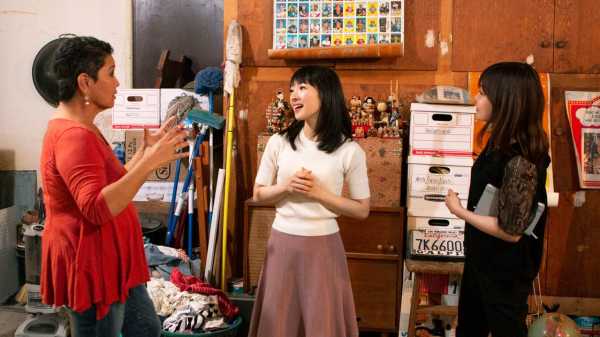
Netflix dropped “Tidying Up with Marie Kondo,” on January 1st, to serve viewers’ urges of self-improvement at the start of the New Year. The show’s optimistic visions of revitalization, achieved through simple efforts toward domestic order, is a decent hangover sedative in itself. Our host is the author of the best-selling self-help guide “The Life-Changing Magic of Tidying Up: The Japanese Art of Decluttering and Organizing.” In each of the season’s eight episodes, Kondo materializes in a home to bless it with her practical philosophy of purging junk. “I love a mess,” she says. She likes a challenge, that is. Each episode of this housekeeping procedural preaches the pleasures of her process. I found it impossible to binge the show, largely because it kept jolting me to the back of the closet in the kids’ room, where I meditated on disused Hot Wheels race tracks.
The introduction finds the petite Kondo approaching an overstuffed closet, daintily hopping to reach a high shelf, and cutely failing. There is perhaps a smidgen of Orientalism in the series’s framing of its Japanese star as a sprite who flutters efficiently across a nonspecific U.S.A., gracing its chaotic households with wisdom. Perhaps she’s not an Other, just otherworldly, in the manner of a fairy godmother or enchanted nanny. Either way, spirituality is essential to her method, and “magic” is central to its meaning; she knows that the unloved stuff in the garage is weighing down the soul. The word “tidying,” with its implication of light dusting and fluffing sofa cushions, is insufficient to the physical task Kondo proposes, which may involve gathering an entire wardrobe of clothing, accumulated over decades, into a linebacker-size pile. This is a vision of the organizational consultant as a freelance exorcist. In its formulation of these tasks not as tedious chores but as energizing exercises, it is in line with current discourse on self-care, in which moisturizing lotions are sacramental ointments.
A typical episode of “Tidying Up,” which grafts Kondo’s methodology onto a familiar makeover-show format, does not offer much in the way of struggle or conflict. Kondo’s mere presence initiates self-directed journeys, and her thorough pleasantness closes off the possibility of “Supernanny”-type scoldings. The sensibility of the production accidentally casts complicated problems as jokes. A black-and-white sequence depicting the frustration of a guy who despairs that his toddlers are “getting the worst of me” finds him venting at his wife. “There are seven pillows on this bed,” he fumes, “and those aren’t even decorative pillows.” The soundtrack simpers along with the generic jangling guitar and mawkish plinking piano of any given HGTV program, but it flips to something chiming and ethereal when Kondo appears alone, in a vaguely celestial setting, addressing the viewer directly in instructional interludes.
Kondo, of course, has a million-dollar catchphrase: initiates must cast out items that fail to “spark joy.” (According to this principle, I chucked my household’s copy of “Life-Changing Magic” after a half hour’s perusal of its welcome advice.) “When you touch the item that sparks joy for you, you feel chi-i-ing . . . all of yourself rising,” Kondo says, in the first episode. When she issues that sound effect—a noise onomatopoeic of crystalline cheer—her voice and smile gleam like a glass in a dish-detergent ad. It’s unspeakably charming. But the laws of brand extension decree that she must keep renewing and reinterpreting the phrase. The buzzword becomes a nagging drone, and related themes are repeated until they begin to sound like nonsense. Knowing that sentimental attachments can be shackles, Kondo directs her clients to fill their hearts with gratitude for items that have outlived their utility. (An expired packet of gravy mix cannot bear this degree of reverence, but that’s neither here nor there.) The show is decent company if you’re just sitting there folding the laundry, and you will be folding it with unprecedented panache—conveying “love to your clothes from the palms of your hands,” Kondo says—if you follow her teachings. “Tidying Up” is mindless television on the topic of mindful domesticity.
Sourse: newyorker.com






